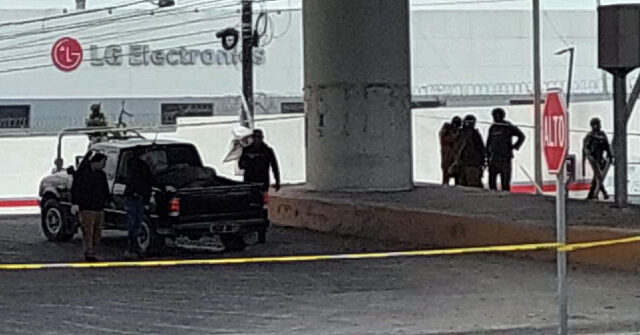In Reynosa, Tamaulipas, a horrific incident unfolded as cartel gunmen left four bodies inside a black Ford Ranger truck near the LG Electronics manufacturing plant. The grim discovery was made on a Sunday morning when authorities received reports about the gruesome sight under an overpass. When the local police arrived, they found the victims tied up and showing signs of torture, with execution-style gunshot wounds. Despite the chilling nature of the crime, no threatening banners or messages were found at the scene. The rapid response from Tamaulipas state police indicated the seriousness of the situation, as they promptly cordoned off the area to manage the investigation.
This gruesome act is thought to be linked to the ongoing territorial conflict between rival factions of the Gulf Cartel. The Metros faction, which operates from Reynosa, has been engaged in violent clashes with the Escorpiones faction, based in Mateomoros. The Escorpiones have been attempting to exert their control over the nearby city of Rio Bravo, compounding the violence in the region. The conflict is causing severe instability in an area that houses multiple industrial sites frequented by international businesses, raising concerns over the potential long-term impact of such rampant violence on foreign investments and operations.
The violence in Reynosa and the surrounding areas has escalated alarmingly in recent months, with shootouts, carjackings, and even the deployment of drones carrying improvised explosive devices (IEDs) becoming commonplace in the turf war. Cartel factions are also utilizing landmines to secure their territories, transforming the vicinity into a battleground. The fierce competition between the Metros and Escorpiones factions has not only endangered those involved in cartel activities but also posed a significant risk to innocent civilians and businesses in areas they control.
Despite the increasing violence and danger in these border regions, it appears that forces from Mexico’s National Guard and Army are avoiding direct confrontations with cartel elements. Many of the confrontations and law enforcement actions seem to be left to the state police, with little engagement from federal forces. Concerns have risen over the effectiveness of law enforcement in addressing cartel operations, especially given the apparent lack of significant raids on cartel stash houses or interventions targeting high-ranking cartel leaders.
The lack of federal action amidst rising violence may signal worrying trends regarding governance and public safety in Tamaulipas. While the state police and local authorities continue to respond to incidents of violence, the absence of comprehensive federal support raises questions about the establishment’s capability to control cartel activity or protect citizens. Added pressure is placed on local law enforcement agencies, which must navigate not only the immediate dangers posed by cartel activities but also the underlying socio-economic instability that such violence breeds.
As the situation continues to evolve, the effects of these cartel conflicts extend beyond immediate fatalities and injuries, influencing local communities and international economic interests. The ongoing instability has the potential to deter international businesses from operating in the region, ultimately affecting economic conditions and job availability. Thus, while cartel violence is a pressing issue for law enforcement, its broader social and economic repercussions warrant critical attention as authorities struggle to address the challenges posed by these powerful criminal organizations.

